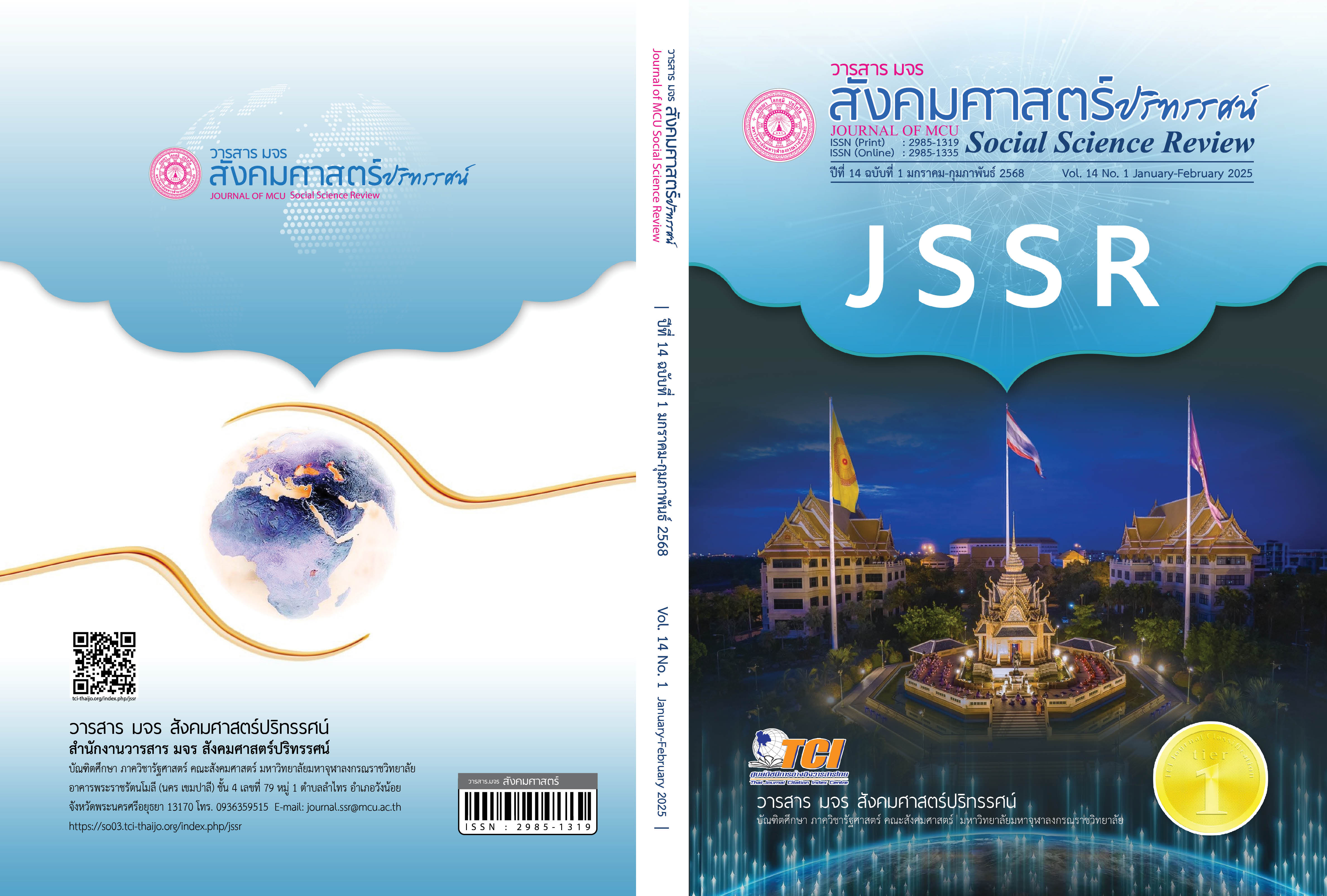การวิเคราะห์องค์ประกอบการพัฒนาสุขภาพองค์การของสถานศึกษาตามแนวคิดการพัฒนาที่ยั่งยืน
คำสำคัญ:
การวิเคราะห์องค์ประกอบ, สุขภาพองค์การ, การพัฒนาที่ยั่งยืน, แนวทางการพัฒนาบทคัดย่อ
บทความวิจัยครั้งนี้มีวัตถุประสงค์ 1. ศึกษาความต้องการจำเป็นในการพัฒนาสุขภาพองค์การตามแนวคิดการพัฒนาที่ยั่งยืน 2. ศึกษาองค์ประกอบ และสร้างแนวทางการพัฒนาสุขภาพองค์การของสถานศึกษาตามแนวคิดการพัฒนาที่ยั่งยืน เป็นการวิจัยผสานวิธี เก็บข้อมูลจากกลุ่มตัวอย่าง ผู้บริหารสถานศึกษา และครู จำนวน 400 คน ได้มาจากการสุ่มตัวอย่างแบบชั้นภูมิ กำหนดความเชื่อมั่น 95% โดยใช้สูตรของ Yamane และเก็บข้อมูลเชิงคุณภาพจากผู้ทรงคุณวุฒิ จำนวน 5 คน ได้มาโดยการเลือกแบบเจาะจง เครื่องมือที่ใช้ในการวิจัย ได้แก่ แบบประเมินความต้องการจำเป็น และแบบสัมภาษณ์ การวิเคราะห์ข้อมูลด้วยสถิติเชิงพรรณนา ได้แก่ ค่าเฉลี่ย ร้อยละ การจัดเรียงลำดับความต้องการจำเป็น (PNImodified) และการวิเคราะห์เนื้อหา
ผลการวิจัยพบว่า 1. ความต้องการจำเป็นของการพัฒนาสุขภาพองค์การ ด้านภาวะผู้นำและการจัดการองค์การ มีความสำคัญสูงสุด รองลงมาคือ ด้านสภาพแวดล้อมและบรรยากาศ ด้านการบริหารจัดการทรัพยากรและการพัฒนาองค์การ และด้านการพัฒนาบุคลากรและความเป็นอยู่ที่ดี ตามลำดับ ส่วนความต้องการจำเป็นของการพัฒนาตามแนวคิดการพัฒนาที่ยั่งยืน ด้านการมีส่วนร่วมและการเชื่อมโยงชุมชน มีความสำคัญสูงสุด รองลงมาคือ ด้านความเสมอภาค ด้านการบูรณาการความหลากหลายทางวัฒนธรรม ด้านการบริหารจัดการเพื่อความยั่งยืน ด้านการจัดการสิ่งแวดล้อมอย่างยั่งยืน และด้านการส่งเสริมสุขภาพองค์รวม ตามลำดับ
2. องค์ประกอบการพัฒนาสุขภาพองค์การของสถานศึกษา ตามแนวคิดการพัฒนาที่ยั่งยืน ประกอบด้วย 4 องค์ประกอบ ได้แก่ 1. ภาวะผู้นำและการจัดการองค์การ 2. ภาพแวดล้อมและบรรยากาศ 3. การพัฒนาบุคลากรและความเป็นอยู่ที่ดี 4. การบริหารจัดการทรัพยากรและการพัฒนาองค์การ และแนวทางการพัฒนาสุขภาพองค์การของสถานศึกษา ตามแนวคิดการพัฒนาที่ยั่งยืน ประกอบด้วย 6 แนวทาง ได้แก่ 1. ด้านการจัดการสิ่งแวดล้อมอย่างยั่งยืน 2. ด้านการส่งเสริมสุขภาพองค์รวม 3. ด้านการมีส่วนร่วมและการเชื่อมโยงชุมชน 4. ด้านความเสมอภาค 5. ด้านการบริหารจัดการเพื่อความยั่งยืน 6. ด้านการบูรณาการความหลากหลายทางวัฒนธรรม
เอกสารอ้างอิง
ธนัตติยา จาตุรนต์ (2558). การพัฒนาตัวบ่งชี้สุขภาพองค์การของสถานศึกษา. วารสารวิจัยการบริหารการศึกษา, 18(3), 67-82.
นิวัฒน์ เจริญศิริ และจตุพล ยงศร. (2564). ภาวะผู้นำของผู้บริหารสถานศึกษากับการพัฒนาองค์กรอย่างมีประสิทธิภาพ. วารสารครุศาสตร์สาร, 17(1), 39-55.
บุญชม ศรีสะอาด. (2545). การวิจัยเบื้องต้น (พิมพ์ครั้งที่ 7). กรุงเทพฯ: สุวีริยาสาส์น.
พรศักดิ์ วัฒนจันทร์. (2564). การศึกษาความเท่าเทียมทางการศึกษาของเด็กในพื้นที่ชนบทและเมือง. วารสารการศึกษาเพื่อการพัฒนา, 13(2), 1-20.
สุภาวดี เชี่ยวชาญ. (2565). ความเสมอภาคทางเพศในระบบการศึกษาไทย: ความก้าวหน้าและความท้าทาย. วารสารวิจัยสังคม, 15(3), 75-90.
สุรศักดิ์ เจริญผล. (2558). สุขภาพองค์การของโรงเรียนพระตำหนักสวนกุหลาบ มหามงคล. สืบค้น 20 กันยายน 2567, จาก https://shorturl.asia/hCIJB
สุวิมล ว่องวาณิช. (2550). การวิจัยประเมินความต้องการจำเป็น (พิมพ์ครั้งที่ 2). กรุงเทพฯ: สำนักพิมพ์แห่งจุฬาลงกรณ์มหาวิทยาลัย.
หยาดอัมรินทร์ ศิริขันธ์. (2562). ความสัมพันธ์ระหว่างสุขภาพองค์การของสถานศึกษากับความทุ่มเทในการปฏิบัติงานของครู. สืบค้น 20 กันยายน 2567, จาก http://grad.vru.ac.th/VRU_Thesis/thesis/file_pdf/full_58 B54650 110.pdf
อภิชาติ ศรีสว่าง. (2561). อิทธิพลของภาวะผู้นำการเปลี่ยนแปลง นวัตกรรมองค์กร และการบริหารจัดการการเปลี่ยนแปลงที่มีผลต่อผลการดำเนินงานของโรงพยาบาลเอกชนในประเทศไทย. วารสารการบริหารและการจัดการ, 4(2), 1-15.
อุทุมพร ศรีประเสริฐ. (2563). การลดความเหลื่อมล้ำทางสังคมในประเทศไทย: การศึกษานโยบายและผลกระทบ. วารสารนโยบายสาธารณะ, 12(1), 45-60.
Albassami, A. M. & Shukla, A. (2019). Models of Organizational Effectiveness for Higher Educational Institutions. International Journal of Innovation, Creativity and Change, 9(3), 102-120.
Brown, K. L. (2019). Reducing Inequalities Through Policy Interventions. International Journal of Policy Studies, 14(1), 45-60.
Global Compact Network Thailand. (2022). Investment map towards the Sustainable Development Goals of Thailand in 2022. Retrieved September 2, 2024, from https://www.globalcompact-th.com/Thailand-SDG-Investor-Map
Hoy, W. K. & Feldman, J. A. (1987). Organizational health: The concept and its measure. Educational and Psychological Research, 9(3), 225-245.
Johnson, R. B. & Lee, M. S. (2018). The Impact of Leadership Styles on Organizational Health: A Study in the Manufacturing Sector. International Journal of Business Management, 13(4), 102-115.
Lee, M. S. & Johnson, R. B. (2018). The Role of Equality in Sustainable Development. Global Development Review, 35(2), 102-118.
Smith, J. A. & Davis, K. L. (2017). Transformational Leadership and Organizational Health: A Study in Non-Profit Organizations. Journal of Leadership Studies, 11(2), 45-60.
Smith, J. A. (2020). Equality in Education: Bridging the Urban-Rural Divide. Journal of Educational Policy Studies, 27(3), 215-230.
Sørensen, K. & Trezona, A. (2022). Organizational Health Literacy in Schools: Concept Development for Health-Literate Schools. International Journal of Environmental Research and Public Health, 19(14), 1-12.
Thapa, A. et al. (2013). A review of school climate research. Review of Educational Research, 83(3), 357-395.
UNESCO. (2015). Education 2030: Incheon declaration and framework for action. Paris, France: UNESCO Publishing.
World Commission on Environment and Development (WCED). (1987). Our common future. UK: Oxford University Press.
ดาวน์โหลด
เผยแพร่แล้ว
รูปแบบการอ้างอิง
ฉบับ
ประเภทบทความ
สัญญาอนุญาต
ลิขสิทธิ์ (c) 2025 วารสาร มจร สังคมศาสตร์ปริทรรศน์

อนุญาตภายใต้เงื่อนไข Creative Commons Attribution-NonCommercial-NoDerivatives 4.0 International License.
เพื่อให้เป็นไปตามกฎหมายลิขสิทธิ์ ผู้นิพนธ์ทุกท่านต้องลงลายมือชื่อในแบบฟอร์มใบมอบลิขสิทธิ์บทความให้แก่วารสารฯ พร้อมกับบทความต้นฉบับที่ได้แก้ไขครั้งสุดท้าย นอกจากนี้ ผู้นิพนธ์ทุกท่านต้องยืนยันว่าบทความต้นฉบับที่ส่งมาตีพิมพ์นั้น ได้ส่งมาตีพิมพ์เฉพาะในวารสาร มจร สังคมศาสตร์ปริทรรศน์ เพียงแห่งเดียวเท่านั้น หากมีการใช้ภาพหรือตารางหรือเนื้อหาอื่นๆ ของผู้นิพนธ์อื่นที่ปรากฏในสิ่งตีพิมพ์อื่นมาแล้ว ผู้นิพนธ์ต้องขออนุญาตเจ้าของลิขสิทธิ์ก่อน พร้อมทั้งแสดงหนังสือที่ได้รับการยินยอมต่อบรรณาธิการ ก่อนที่บทความจะได้รับการตีพิมพ์ หากไม่เป็นไปตามข้อกำหนดเบื้องต้น ทางวารสารจะถอดบทความของท่านออกโดยไม่มีข้อยกเว้นใดๆ ทั้งสิ้น





